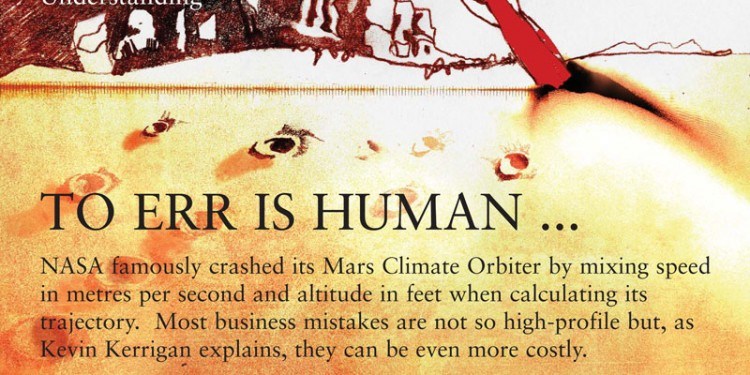NASA famously crashed its Mars Climate Orbiter by mixing speed in metres per second and altitude in feet when calculating its trajectory. Most business mistakes are not so high-profile but, asKevin Kerrigan explains, they can be even more costly.
Employee mistakes on the job are costing businesses dearly. Our recent report into the losses found that UK business are losing around £10 billion a year through poor people management.
British workers claim that almost three-quarters of the slip-ups they make on the job never come to light. So the real cost in terms of opportunity could be many times higher. These blunders are left to fester as employees keep quiet about their mistakes and managers fail to spot and correct them.
So what exactly is it that employees are going to great lengths to conceal? Some of the most common mistakes covered up include sending sensitive or damaging e-mails to the wrong contacts, forgetting deadlines, giving the wrong information and adding/omitting a nought on orders. These mistakes are, by and large, the sort of thing that can happen to anyone from time to time, yet collectively have a major impact on the bottom line. Furthermore, many of these mistakes are the types of error that can be tackled and reduced through a change in approach to blunders on the job.
Of course, the impact of mistakes will vary according to who has made the mistake and the nature of the business. For example, a slip up by a machine operator could have a very different impact to one made by a receptionist.
Yet the problem is draining businesses at every level, and is one that needs to be tackled. It appears to be the attitude towards mistakes within an organization that is breeding a culture of back-covering. Businesses need to foster a culture of openness, in which staff feel that they won’t be victimized if they make a mistake.
Moreover, managers should receive adequate training to help them act sensitively when dealing with employees who have made an error. (See box, The right culture, p42).
Ensuring that all workers have a clear idea of their roles and responsibilities, and making sure that they are selected and developed in a manner that ensures an excellent fit between worker and role are crucial aspects in raising productivity and reducing mistakes. It stands to reason that, if a person is naturally averse to close analysis yet is given a role in which attention to detail is essential, slip-ups are going to occur.
To read the full article, please download the PDF above.

